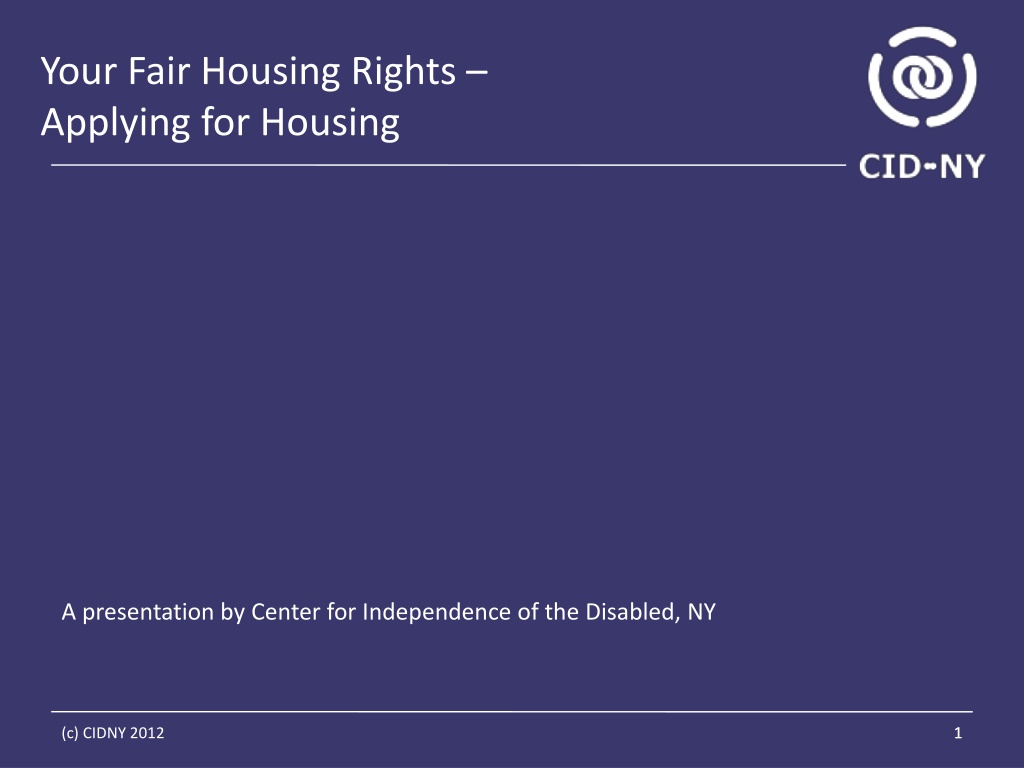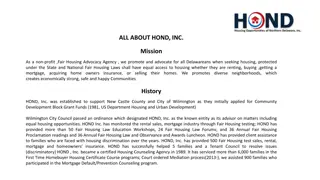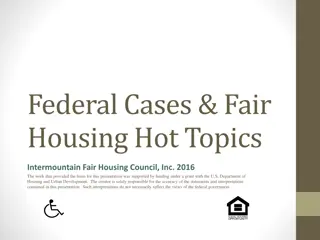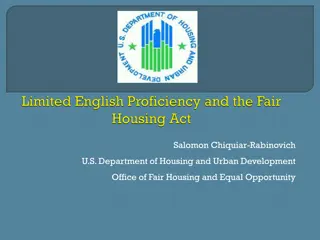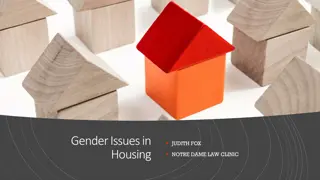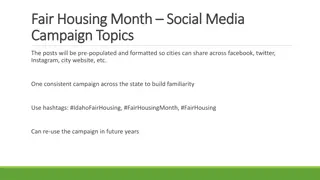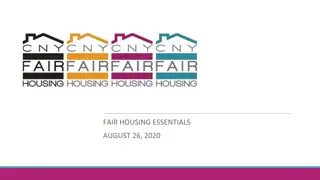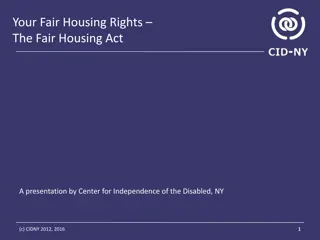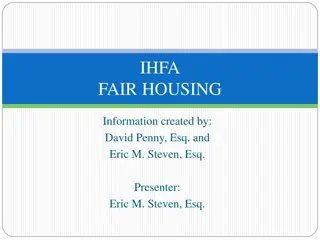Understanding Your Fair Housing Rights When Applying for Housing
Meeting with a landlord before renting a home is a common step, but there are important considerations to remember, especially for individuals with disabilities. The Fair Housing Act protects individuals from discriminatory practices during the housing application process. Landlords are restricted in the questions they can ask potential tenants, particularly regarding disabilities, medical history, and other sensitive information. However, landlords can inquire about financial stability, references, and willingness to comply with building rules. It's essential for tenants to be aware of their rights and how to request reasonable accommodations during the rental application process.
Download Presentation

Please find below an Image/Link to download the presentation.
The content on the website is provided AS IS for your information and personal use only. It may not be sold, licensed, or shared on other websites without obtaining consent from the author. Download presentation by click this link. If you encounter any issues during the download, it is possible that the publisher has removed the file from their server.
E N D
Presentation Transcript
Your Fair Housing Rights Applying for Housing A presentation by Center for Independence of the Disabled, NY (c) CIDNY 2012 1 1
Meeting the Landlord Often, before you rent a home, you will need to meet with the home s owner or someone who works for the home s owner A reasonable accommodation is a change in rules, policies, or services so that a person with a disability will have an equal opportunity to use and enjoy a home. If your disability prevents you from meeting at the property, you may request a reasonable accommodation. For instance, you may request to meet elsewhere or to communicate by phone. (c) CIDNY 2012 2
Meeting the Landlord The Fair Housing Act prohibits a landlord from asking you certain questions. A landlord CANNOT ask you about your disability, unless: You are applying for housing only open to persons with certain disabilities, or You are asking for a reasonable accommodation A landlord should NEVER: Ask for your medical records Require you to prove that or ask whether you can live independently (c) CIDNY 2012 3
Meeting the Landlord Examples of questions a landlord generally CANNOT ask: Do you have a disability? How serious is your disability? Have you ever been hospitalized because of a disability? Can I see your medical records? What medications do you take? How often do you see a doctor? Are you able to live by yourself? Have ever been treated for substance abuse? (c) CIDNY 2012 4
Meeting the Landlord A landlord CAN: Request financial information to determine whether you can pay the rent Request references about your history as a tenant Ask whether you are willing to comply with building rules Ask whether you are currently using drugs Ask about criminal history, including convictions for the manufacture or distribution of a controlled substance A landlord CANNOT ask you a question that he/she does not ask all other potential tenants. or to allow a cosigner to compensate for poor You may request a reasonable accommodation to comply with these requests. For instance, you may ask your landlord to accept a reference from a group home instead of landlord references, credit history (c) CIDNY 2012 5
Completing the Rental Application You may also need to complete a rental application. If you cannot complete the application because of your disability, you may request a reasonable accommodation. For instance, you may request that the application be read to you instead of provided only in written format, or that the application be mailed to you if you cannot pick it up in person. The rental application should NOT seek information about disability, medical history, or ability to live independently. (c) CIDNY 2012 6
Requesting An Accommodation Consider whether, because of your disability, you will need an accommodation to live in the home you wish to rent. For example, if required to make housing usable because of your disability, you could request: Reserved parking Waiver of guest/parking fees for home health aide Oral reminders to pay rent Waiver of no pets policy A particular apartment location (e.g., lower floor, quieter area) While you can request these accommodations, a landlord CANNOT force you to accept any accommodation you do not want (c) CIDNY 2012 7
Requesting An Accommodation A landlord does not need to grant an accommodation if it poses an undue burden or requires a fundamental alteration of operations. For example: It would not create an undue burden to request that a landlord accept rent a few days late because you must wait for your Social Security check, or by mail instead of in person. But it would create an undue burden to ask a landlord to forgo rent altogether. It would not require a fundamental alteration for a landlord to allow a live-in caregiver or a pet in a unit. But it would require a fundamental alteration for a landlord to pay the caregiver or care for the pet. (c) CIDNY 2012 8
Requesting An Accommodation You can discuss accommodations with a landlord during the application process, but you should request any needed accommodations in writing if possible so that you can prove you made the request. It is your responsibility to request accommodations. Your request should state that you have a disability and explain, as specifically as possible, why the requested accommodation would be helpful. A landlord CAN request prove that you have a disability and need the requested accommodation. But you do NOT need to give a landlord the specifics of your disability or a full medical history. (c) CIDNY 2012 9
Requesting a Modification Also consider whether you will need to make reasonable modifications physical changes to the home you wish to rent because of your disability. Generally, you will need to pay for physical changes to the home. You may also be required to undo physical changes when you stop renting the home. For some changes, a landlord may require you to set aside money to undo the changes. You should request any needed modifications in writing if possible. Once you and the landlord have agreed on modifications, ask the landlord to confirm your agreement in writing. (c) CIDNY 2012 10
How to Recognize Discrimination Your application for housing is rejected because of your disability. Landlords CANNOT refuse to rent to you because of your disability unless: You cannot meet obligations that apply to all tenants. BUT: If a reasonable accommodation would let you meet general obligations, a landlord can t reject your application because you can t comply with those obligations. A landlord s conclusion that you cannot meet obligations must be based on recent, credible evidence. Your landlord must consider any evidence that past failures to meet obligations were related to your disability and are not likely to be repeated. For instance, if your disability prevents you from delivering rent in person, your landlord must consider allowing you to deliver rent by mail. (c) CIDNY 2012 11
How to Recognize Discrimination If your living in the home would be a direct threat to the health or safety of others or would result in substantial damage to the property of others. BUT: A landlord s conclusion that you pose a threat to persons or property must be based on recent, credible evidence. If a reasonable accommodation would let you eliminate the threat, a landlord can t reject your application based on the threat. Your landlord must consider any evidence that past conduct was related to your disability and is not likely to be repeated. (c) CIDNY 2012 12
How to Recognize Discrimination A landlord refuses to offer you the same rental agreement offered to other tenants. A landlord CANNOT charge you extra money or include extra requirements in your lease because of your disability. For example: You may NOT be required to pay an extra security deposit because you use a wheelchair. A landlord may NOT require you to have a caretaker live with you. A landlord may NOT require you to sign more or broader liability waivers than are required of other tenants. A landlord asks questions about your disability and/or medical condition. A landlord refuses your request for a reasonable accommodation or modification. (c) CIDNY 2012 13
For More Information Contact: ESTER BENJAMIN, Olmstead Housing Specialist at 917-476-6836 ebenjamin@cidny.org ZOLA MENDOZA Olmstead Housing Specialist at 917-443-7731 zmendoza@cidny.org CIDNY 841 Broadway, Ste. 301 New York, NY 10003 (c) CIDNY 2012 14
